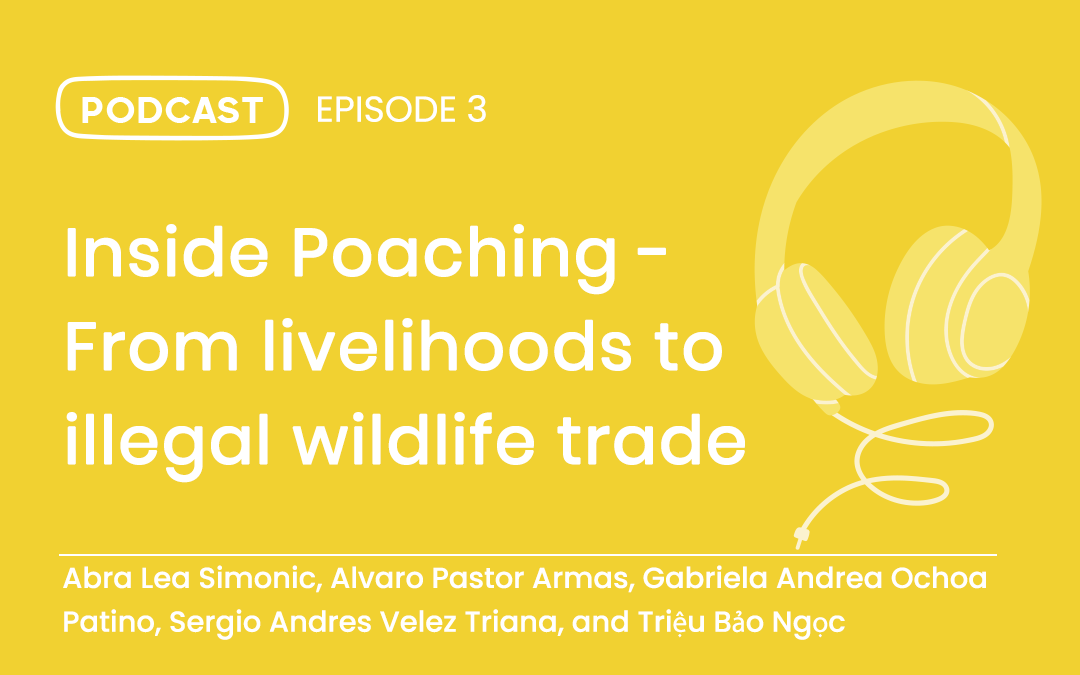Inside poaching From livelihoods to illegal wildlife trade
Abstract
Thinking of poaching, words like ‘illegal’, ‘bad’, ‘wrong’ usually come to people’s mind, but have you ever wondered what might prompt people in such activities? Illegal poaching and trading of wildlife has destructive and catastrophic impacts on the ecosystem, society and the economy of the countries around the globe. Thus, understanding the history and the reasons behind poachers and poaching could potentially help to redirect resources and create different laws to achieve the goal of zero poaching. In this episode, we tried to expose the reality behind poachers, the nuances of this practice and potential solutions regarding conservation measures.
Credits
Guests/interviewees: Mr. Phạm Văn Thông, research manager at Save Vietnam Wildlife; and Ms. Nguyễn Thiên Hương, research officer & project coordinator at Greenviet.
Inspired by: Ms. Nguyễn Tâm Anh, field researcher and conservation education officer at Wildlife at Risk.
References
Antunes, A. P., et al. (2019). A conspiracy of silence: Subsistence hunting rights in the Brazilian Amazon. Land Use Policy, 84, 1–11. https://doi.org/10.1016/j.landusepol.2019.02.045
Baker, S. E., et al. (2013). Rough Trade: Animal Welfare in the Global Wildlife Trade. Bioscience, 63(12), 928–938. https://doi.org/10.1525/bio.2013.63.12.6
Batavia, C., et al. (2019). The elephant (head) in the room: A critical look at trophy hunting. Conservation Letters, 12(1), e12565. https://doi.org/10.1111/conl.12565
Brown, J. (2020, November 4).Why do poachers exist? – KnowledgeBurrow.com.https://knowledgeburrow.com/why-do-poachers-exist/
Büscher, B., & Fletcher, R. (2018). Under pressure: Conceptualising political ecologies of green wars. Conservation and Society, 16(2), 105–113.
Cooney, R., et al. (2017), From Poachers to Protectors: Engaging Local Communities in Solutions to Illegal Wildlife Trade. Conservation Letters, 10: 367-374. https://doi.org/10.1111/conl.12294
Duffy, R., et al. (2019). Why we must question the militarisation of conservation. Biological Conservation, 232, 66–73. https://doi.org/10.1016/j.biocon.2019.01.013
Eliason, S. L. (1997). A sociological analysis of poaching: Techniques of neutralization used by deer poachers in the western United States [PhD Thesis]. Oklahoma State University.
Griffith, M. (Director). (n.d.). Hotspot. https://www.youtube.com/watch?v=KY08NIXvrxc
Knapp, E. J., et al. (2017). Poachers and Poverty: Assessing Objective and Subjective Measures of Poverty among Illegal Hunters Outside Ruaha National Park, Tanzania. Conservation and Society, 15(1), 24–32. http://www.jstor.org/stable/26393268
Kühl, A., et al. (2009). The role of saiga poaching in rural communities: Linkages between attitudes, socio-economic circumstances and behaviour. Biological Conservation, 142(7), 1442–1449. https://doi.org/10.1016/j.biocon.2009.02.009
Laws, E. (2017). The political economy of the illegal wildlife trade.
Massé, F. (2020). Conservation Law Enforcement: Policing Protected Areas. Annals of the American Association of Geographers, 110(3), 758–773. https://doi.org/10.1080/24694452.2019.1630249
Moneron, S., et al. (2020). The People Beyond the Poaching. TRAFFIC International. https://www.traffic.org/site/assets/files/13210/web-beyond-the-poaching-offender-survey.pdf
Nash, S. (2019, April 1). Vietnam’s Empty Forests. The New York Times. https://www.nytimes.com/2019/04/01/travel/vietnam-wildlife-species-ecotravel-tourism.html
Prasad, K., et al. (2018). Community Based Anti-poaching Operation: Effective Model for Wildlife Conservation in Nepal. Poultry, Fisheries & Wildlife Sciences, 6: 195. 10.4172/2375-446X.1000195.
‘t Sas-Rolfes, M., et al. (2019). Illegal Wildlife Trade: Scale, Processes, and Governance. Annual Review of Environment and Resources, 44(1), 201–228. https://doi.org/10.1146/annurev-environ-101718-033253
UNODC (2020) World Wildlife Crime Report 2020: Trafficking in Protected Species. https://www.unodc.org/documents/data-and-analysis/wildlife/2020/World_Wildlife_Report_2020_9July.pdf
UN (2022) Reports: SDG 15, Life on Land. https://unstats.un.org/sdgs/report/2022/goal-15/
Wyatt, T., van Uhm, D., & Nurse, A. (2020). Differentiating criminal networks in the illegal wildlife trade: Organized, corporate and disorganized crime. Trends in Organized Crime, 23(4), 350–366. https://doi.org/10.1007/s12117-020-09385-9
WWF (n.d) How Nepal achieved zero poaching. https://tigers.panda.org/news_and_stories/stories/how_nepal_achieved_zero_poaching/
